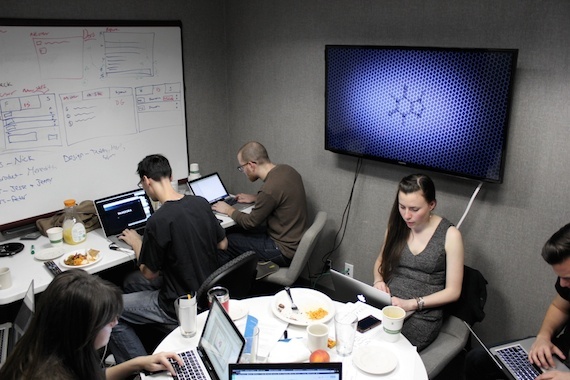Warby Parker is one of the darlings of the social enterprise movement. The eyewear brand is rapidly growing and even has its own collection of sunglasses designed by Victoria Secret model Karlie Kloss. They recently achieved the incredible milestone of giving away a million pairs of glasses to those in need through their "buy a pair give a pair" program.
We love this shot of @karliekloss snapped by @AmyTAstley tonight while celebrating our collaboration! #karliexwarby pic.twitter.com/CbtARmynPm
— Warby Parker (@WarbyParker) June 10, 2014
I found myself naturally being a huge fan of Warby Parker and became increasingly curious as to how technology is empowering them and their social mission through the use of software. Take the journey with me as I talk with Dave Gilboa, Co-Founder & Co-CEO and Lon Binder, Vice President of Technology at Warby Parker to find out just how they do this.
Do you view Warby Parker as a technology company?
Dave: We've always thought of ourselves as a brand first but we view ourselves very much as a technology company. Ever since we conceived Warby Parker, we knew we wanted to build a technology enabled lifestyle brand. Technology is the backbone behind everything that we do as a company.
Lon: There are a couple of things to think about as measures of what's a technology company. While we're not selling software, we create a tremendous amount of software in house. One of our larger projects that we've wrapped up recently was building a platform in house that we're continuing to build applications on top of. That really speaks to the level of sophistication Warby Parker has around software.
What's it like scaling the accelerated growth that Warby Parker is experiencing?
Lon: Scaling has been an interesting challenge at Warby Parker. We built systems that are flexible enough to accommodate both scaling vertically and horizontally in terms of customer growth and functional growth.
A major decision was to move to Python as our core programing language. This is not uncommon, most of the major organizations that we speak with are shifting to having a major investment in Python. Our thinking here is aligned with support for scale, rapid prototyping and agility. Python also gave us a good balance between flexibility, performance, maturity and a large community.
In terms of other components, we're using PostgreSQL for our databases. There are numerous reasons why but one of the best things is that it allows us to be as flexible as we needed to be with our schema design which enabled us to be more adaptive towards changing business needs and had a number of different engines underneath that we could take advantage of along with its very broad community.
How does software empower the social conscious aspects of Warby Parker?
Lon: There's a strong desire for people to do good especially in the technology universe. We have an active open source program where we give away quite a bit of software that we create.
Other things are less direct to Warby Parker. Lauralynn Drury of our team who's a member of the Blue Engine Young Professionals Group, came up with a wonderful idea to donate some engineering time from Warby Parker to Blue Engine. We've done that through 2014 and completed a project for them called BEST (Blue Engine Student Tracker). You can find it along with all the other tools and software we've open sourced on our GitHub page.

Credit: Warby Parker - The Warby Parker Team Hacking Away
What advice would you give to entrepreneurs looking to start a socially conscious business?
Dave: The biggest thing is recognizing that the social mission should be built in from day one. If you are building a for-profit business it has to be a profitable sustainable business that scales. We get a lot of people that are very passionate about a certain cause but when you break down the numbers you realize that the economics really aren't sustainable for what they're proposing.
In some cases it might be more appropriate for a non-profit or just to rethink the economic side of things. We recognize that the bigger that we become as a business, the bigger the ultimate impact we can have on the world is. Any for-profit business needs to consider that as they build for scale.
Where do you see the company 5 years from now?
Dave: It's hard for us to think that far in the future given how quickly our business is changing. We can certainly say that we will be several times the size that we're today with millions of happy customers. Five years from now we'll have a bigger global presence since there's a huge global opportunity and we'll continue to expand our product offering.
Lon: One thing that is important to us internally is technology being an enabler to the companies growth which over the 5 year horizon is a tremendous challenge considering what's happening in the organization.
From an external perspective it's really important for us to share our learnings. We're going through a very unique experience of very excessive growth that is changing the way eyeglasses are sold in the world and the way ecommerce and retail work together to be a better experience for customers.
I hope that over the 5 year horizon not only do we learn a lot but we also share that knowledge with other companies and that they can take advantage of our experiences.
What are your thoughts? Leave a comment below and share this article with your friends.